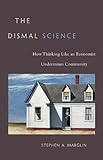The dismal science : how thinking like an economist undermines community / Stephen A. Marglin.
Material type: TextPublication details: Cambridge, MA : Harvard University Press, 2008Description: xvi, 359 p. ; 25 cmISBN: 9780674026544; 0674026543Other title: Thinking like an economist undermines communitySubject(s): Economics -- Sociological aspects | Markets -- Social aspects | Economic development -- Social aspects | Communities | Social structure -- Economic aspectsDDC classification: 306.3 LOC classification: HB724 | .M37 2008
TextPublication details: Cambridge, MA : Harvard University Press, 2008Description: xvi, 359 p. ; 25 cmISBN: 9780674026544; 0674026543Other title: Thinking like an economist undermines communitySubject(s): Economics -- Sociological aspects | Markets -- Social aspects | Economic development -- Social aspects | Communities | Social structure -- Economic aspectsDDC classification: 306.3 LOC classification: HB724 | .M37 2008| Item type | Current library | Collection | Call number | Copy number | Status | Date due | Barcode |
|---|---|---|---|---|---|---|---|
 Book
Book
|
University of Macedonia Library Βιβλιοστάσιο Α (Stack Room A) | Main Collection | HB724.M37 2008 (Browse shelf (Opens below)) | 1 | Checked out | 07/10/2024 | 0013109909 |
Includes bibliographical references (p. 333-350) and index.
1. Economics, the market, and community -- 2. What is community? and is it worth the cost? -- 3. The cutting edge of modernity -- 4. Individualism -- 5. Some history -- 6. From vice to virtue in a century -- 7. How do we know when we do not know? -- 8. Sources of the modern ideology of knowledge -- 9. Taking experience seriously -- 10. Welfare economics and the nation-state -- 11. Why is enough never enough? -- 12. The economics of tragic choices -- 13. From imperialism to globalization, by way of development -- Appendix A. The limits of dissent -- Appendix B. The distributional roots of the enclosure movement.
"Economists celebrate the market as a device for regulating human interaction without acknowledging that their enthusiasm depends on a set of half-truths: that individuals are autonomous, self-interested, and rational calculators with unlimited wants and that the only community that matters is the nation-state. However, as Stephen Marglin argues, market relationships erode community. In the past, for example, when a farm family experienced a setback - say the barn burned down - neighbours pitched in. Now a farmer whose barn burns down turns, not to his neighbours, but to his insurance company. Insurance may be a more efficient way to organize resources than a community barn raising, but the deep social and human ties that are constitutive of community are weakened by the shift from reciprocity to market relations.Marglin dissects the ways in which the foundational assumptions of economics justify a world in which individuals are isolated from one another and social connections are impoverished as people define themselves in terms of how much they can afford to consume. Over the last four centuries, this economic ideology has become the dominant ideology in much of the world. Marglin presents an account of how this happened and an argument for righting the imbalance in our lives that this ideology has fostered." -- Cover.





There are no comments on this title.